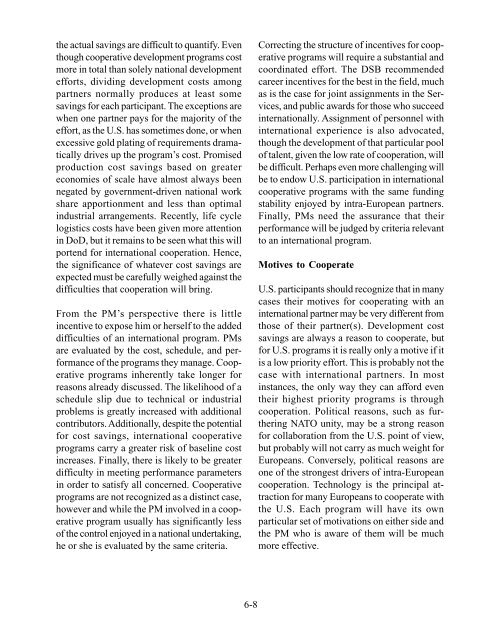Transatlantic Armaments Cooperation - Federation of American ...
Transatlantic Armaments Cooperation - Federation of American ...
Transatlantic Armaments Cooperation - Federation of American ...
You also want an ePaper? Increase the reach of your titles
YUMPU automatically turns print PDFs into web optimized ePapers that Google loves.
the actual savings are difficult to quantify. Even<br />
though cooperative development programs cost<br />
more in total than solely national development<br />
efforts, dividing development costs among<br />
partners normally produces at least some<br />
savings for each participant. The exceptions are<br />
when one partner pays for the majority <strong>of</strong> the<br />
effort, as the U.S. has sometimes done, or when<br />
excessive gold plating <strong>of</strong> requirements dramatically<br />
drives up the program’s cost. Promised<br />
production cost savings based on greater<br />
economies <strong>of</strong> scale have almost always been<br />
negated by government-driven national work<br />
share apportionment and less than optimal<br />
industrial arrangements. Recently, life cycle<br />
logistics costs have been given more attention<br />
in DoD, but it remains to be seen what this will<br />
portend for international cooperation. Hence,<br />
the significance <strong>of</strong> whatever cost savings are<br />
expected must be carefully weighed against the<br />
difficulties that cooperation will bring.<br />
From the PM’s perspective there is little<br />
incentive to expose him or herself to the added<br />
difficulties <strong>of</strong> an international program. PMs<br />
are evaluated by the cost, schedule, and performance<br />
<strong>of</strong> the programs they manage. Cooperative<br />
programs inherently take longer for<br />
reasons already discussed. The likelihood <strong>of</strong> a<br />
schedule slip due to technical or industrial<br />
problems is greatly increased with additional<br />
contributors. Additionally, despite the potential<br />
for cost savings, international cooperative<br />
programs carry a greater risk <strong>of</strong> baseline cost<br />
increases. Finally, there is likely to be greater<br />
difficulty in meeting performance parameters<br />
in order to satisfy all concerned. Cooperative<br />
programs are not recognized as a distinct case,<br />
however and while the PM involved in a cooperative<br />
program usually has significantly less<br />
<strong>of</strong> the control enjoyed in a national undertaking,<br />
he or she is evaluated by the same criteria.<br />
6-8<br />
Correcting the structure <strong>of</strong> incentives for cooperative<br />
programs will require a substantial and<br />
coordinated effort. The DSB recommended<br />
career incentives for the best in the field, much<br />
as is the case for joint assignments in the Services,<br />
and public awards for those who succeed<br />
internationally. Assignment <strong>of</strong> personnel with<br />
international experience is also advocated,<br />
though the development <strong>of</strong> that particular pool<br />
<strong>of</strong> talent, given the low rate <strong>of</strong> cooperation, will<br />
be difficult. Perhaps even more challenging will<br />
be to endow U.S. participation in international<br />
cooperative programs with the same funding<br />
stability enjoyed by intra-European partners.<br />
Finally, PMs need the assurance that their<br />
performance will be judged by criteria relevant<br />
to an international program.<br />
Motives to Cooperate<br />
U.S. participants should recognize that in many<br />
cases their motives for cooperating with an<br />
international partner may be very different from<br />
those <strong>of</strong> their partner(s). Development cost<br />
savings are always a reason to cooperate, but<br />
for U.S. programs it is really only a motive if it<br />
is a low priority effort. This is probably not the<br />
case with international partners. In most<br />
instances, the only way they can afford even<br />
their highest priority programs is through<br />
cooperation. Political reasons, such as furthering<br />
NATO unity, may be a strong reason<br />
for collaboration from the U.S. point <strong>of</strong> view,<br />
but probably will not carry as much weight for<br />
Europeans. Conversely, political reasons are<br />
one <strong>of</strong> the strongest drivers <strong>of</strong> intra-European<br />
cooperation. Technology is the principal attraction<br />
for many Europeans to cooperate with<br />
the U.S. Each program will have its own<br />
particular set <strong>of</strong> motivations on either side and<br />
the PM who is aware <strong>of</strong> them will be much<br />
more effective.
















